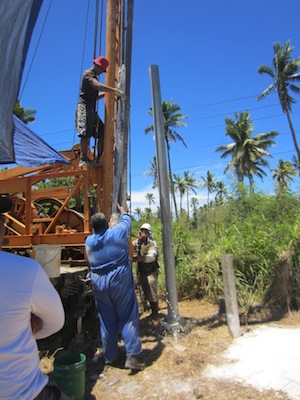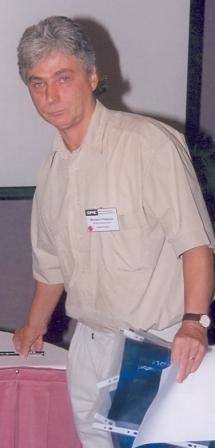The Birth of a New STAR: Address by the Prime Minister, Hon. Henry Puna
Saturday, 10 November 2012 09:18
administrator
Science Technology and Resources (STAR) Network 2012 Annual Meeting
5 November 2012
Secretariat of the Pacific Community, Noumea
Chair of STAR, Professor John Collen,
Director General of the SPC, Dr Jimmie Rodgers
Director of IRD, Dr Gilles Fediere
Members of the STAR scientific and technical network
Friends
I have great pleasure in being here today to be a part of the 29th Annual Science Technology and Resources Network Meeting, and to become freshly-acquainted with such a prestigious body that has a deep history of engagement and service to the Region.
I’m honoured to address you today – and in conjunction with the Second Meeting of the SPC Applied Geoscience and Technology Division, tomorrow.
The Cook Islands itself has had the opportunity to host two STAR annual meetings – first in 1986 and again in 1995. To the STAR veterans out there – and I’m told there’s four of you – who had the earlier experience of meeting in Rarotonga, I say ‘Kia Orana’ to you.
And to those, who have not yet had the pleasure, I’ll see what I can do to help arrange one of your forthcoming gatherings in the Cook Islands.
I think by now you may have heard that we ‘showered’ the Pacific Leaders with an unforgettable experience during the Pacific Islands Forum – and Dr. Rodgers I’m sure – will attest to what was a major highlight of the year for us as hosts.
It would be pleasing for me to see you all in Rarotonga next time, should we have the opportunity to host your annual meeting.
Manihiki Farmer
In just two short years, I’ve had a challenging time as Leader, and the thought often hits me that: I’m a long way from my former life as a farmer back in Manihiki – our Northern Group atoll renowned for its black pearls.
Last Updated on Saturday, 10 November 2012 09:21
Read more...
Second Annual Meeting of SOPAC Division
Tuesday, 06 November 2012 12:49
administrator
The Secretariat of the Pacific Community (SPC) Applied Geoscience and Technology Division will hold its annual meeting from 6 to 9 November 2012 at SPC headquarters in Noumea, New Caledonia. This annual meeting will allow geoscience officials from SPC member countries to meet and exchange ideas on issues of importance to the Pacific.
The goal of the Applied Geoscience and Technology Division is to apply geology, oceanography and other earth sciences, along with technology, to realise new opportunities for improving the livelihoods of Pacific communities. The division is structured in three technical programmes: Ocean and Islands, Water and Sanitation, and Disaster Reduction.
The conference will include discussions on important regional issues like mining of deep sea mineral deposits and management of the region’s fragile fresh water resources. But the division will also highlights emerging issues and opportunities with specific presentations on topics such as reducing the risk of storm waves and surges in the Tuamotu Archipelago, or the institutionalisation of disaster risk management training in Solomon Islands.
The media are invited to the opening ceremony on Tuesday 6 November at 8:30 a.m in the main conference room at SPC headquarters. The opening will be made by Mr Henry Puna, Cook Islands Prime Minister.
Last Updated on Tuesday, 06 November 2012 12:52
Drilling for Tonga’s Water Quality
Friday, 02 November 2012 11:46
administrator

The first three of six boreholes planned for Tongatapu have been drilled to a depth of approximately 50 metres near the international airport and at the Mataki‘eua wellfield in Tonga.
Funded by the EU Disaster Risk Reduction Project in Eight Pacific ACP States (B-Envelope) and implemented by the Applied Geoscience and Technology (SOPAC) Division of the Secretariat of the Pacific Community (SPC), the project is working closely with Tonga’s Ministry of Lands, Environment, Climate Change and Natural Resources to bore holes that will be used to monitor water quality on Tongatapu.
Last Updated on Friday, 02 November 2012 11:49
Read more...
SPC Workshop On Safety At Sea and Economic Development
Thursday, 27 September 2012 08:25
administrator

TUESDAY 25 SEPTEMBER 2012 - ‘It really is very simple. The workshop is about improving the safety of life at sea.’
Dr Russell Howorth of the Secretariat of the Pacific Community (SPC) made this comment in his opening address of the Hydrographic Surveying and Nautical Charting Workshop, taking place at Fiji’s Naval Headquarters from 24 September to 5 October.
Dr Howorth, Director of SPC Applied Geoscience and Technology Division, said that the aim of the workshop, funded by the International Maritime Organization (IMO) and organised by SPC, is to assist the participating countries to meet the basic requirements of navigation and safety as required and regulated by IMO’s International Convention for the Safety of Life at Sea.
‘We must support campaigns to raise awareness of the safety and economic importance of hydrographic surveying and nautical charting services in the region,’ said Dr Howorth.
Hydrographic surveys refer to mapping the seabed, while nautical charts show maritime areas and include features of the seabed, navigational hazards and other details; charts being to ships what roadmaps are to cars.
Last Updated on Thursday, 27 September 2012 08:38
Read more...
|
SOPAC talks about Deep Sea Minerals and Water Resource Management
Friday, 09 November 2012 11:50
administrator
Deep Sea Minerals – At the 2009 Pacific Island Forum meeting, Leaders agreed a number of key priority areas for progressing the Pacific Plan including: “the development of a regional framework for deep sea minerals that shall be used by Pacific ACP States to formulate national legal instruments for the governance and administration of marine mineral resources”. Under Key Result Area 1 of the SPC-EU EDF10 Deep Sea Minerals (DSM) Project, a Regional Legislative and Regulatory Framework (RLRF) for Deep Sea Minerals Exploration and Exploitation has been developed to ensure (i) environmental protection, (ii) countries are prepared to meaningfully engage in this new industry, and (iii) long term sustainable benefits for the Pacific Islands Region.
The inaugural DSM Project regional workshop that was held in Nadi Fiji in June 2011 was an opportunity to bring together deep sea mineral experts around the world, representatives of Pacific ACP States as well as private sector and civil society to discuss various deep sea mineral issues and collectively identify priority areas and agree on a concerted way forward for the region.
Following the inaugural workshop, a Terms of Reference (ToR) for the development of the RLRF was prepared but it was not until the completion of the November 2011 International Workshop focusing on the environmental management needs for deep sea mineral activities that was organised by the International Seabed Authority (‘ISA’) in collaboration with the SPC through the DSM Project and the Government of Fiji that the RLRF was subsequently drafted.
Read more...
Opening of 2nd Annual Meeting of SOPAC Division
Wednesday, 07 November 2012 14:46
administrator

The Pacific region is known to be one of the areas of the planet that is most exposed to disaster hazards and now must also cope with more frequent and more intense climate change events. Regular occurrences such as flooding, cyclones and drought are being amplified by the effects of climate change.
The Honourable Henry Puna, the Prime Minister of Cook Islands, has graced the opening. He spoke about his pleasure at having been invited to the STAR meeting and the annual meeting of the SPC’s Applied Geoscience and Technology division here in Noumea. Since the start of the SOPAC, Cook Islands has benefited from its services as a member, and the country has had the pleasure of hosting its annual meeting three times. The Prime Minister who was invited also in his capacity as the Chair of the Pacific Islands Forum thanked Dr. Russell Howorth for his outstanding services to the region and to the SOPAC division.
Last Updated on Wednesday, 07 November 2012 14:52
Read more...
New Divison Director Appointed
Tuesday, 30 October 2012 07:16
administrator

Professor Michael (Mike) George Petterson has been appointed the new Director of SPC's Applied Geoscience and Technology (SOPAC) Division. He is expected to take up the position in the second half of January, 2013.
Professor Petterson will the the baton from Dr. Russell Howorth, current Director of SOPAC Division, whose tenure ends in January, 2013.
Read Full Appointment Announcement from Director-General, Dr. Jimmie Rodgers.
Last Updated on Friday, 02 November 2012 11:52
Kiribati To End Beach Mining For Aggregates
Monday, 24 September 2012 09:47
administrator

Quarrying for sand gravel in Kiribati’s most populated atoll island South Tarawa will soon be replaced by a safer and a more sustainable alternative – lagoon dredging.
The Kiribati Government, through its European Union-funded Environmentally Safe Aggregates for Tarawa (ESAT) project, implemented by the Secretariat of the Pacific Community’s SOPAC Division, hopes to phase out beach aggregate mining on South Tarawa. The mining has caused severe coastal erosion problems on the already vulnerable atoll island.
Beach aggregate is a combination of sand, gravel, pebbles and stones primarily used in making concrete, road maintenance, the building industry and most general construction.
Through its Oceans and Islands Programme, SOPAC has undertaken technical work on coastal vulnerability on South Tarawa for many years. During this time, a continuing stress highlighted since the 1980s has been the damaging impact of beach mining on shoreline systems, caused by intense and unsustainable extraction of aggregates.
The ESAT project, which was established to explore alternative sources of beach aggregates, has identified Tarawa’s lagoon.
Last Updated on Thursday, 27 September 2012 08:39
Read more...
|


















